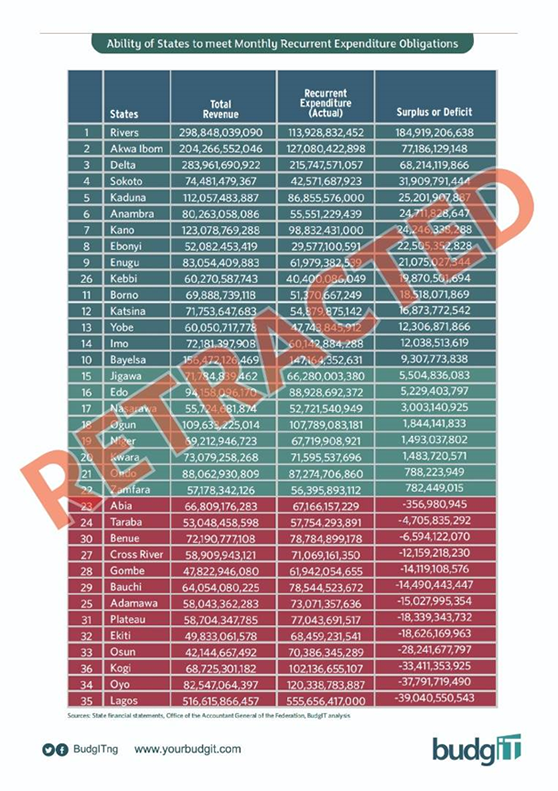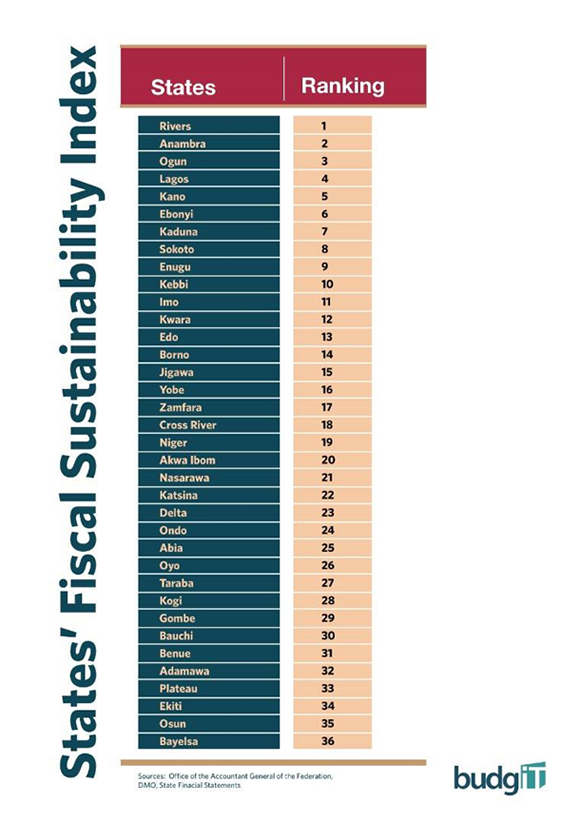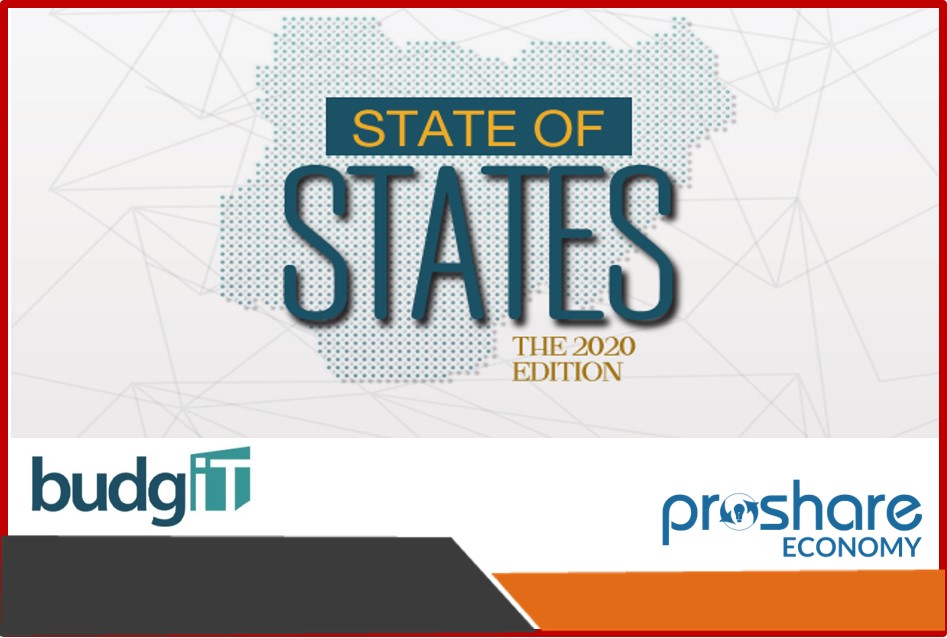Thursday,September 24, 2020 / 5:04 PM / By BudgIT / Header Image Credit: BudgIT
2020States' Fiscal Sustainability Index
RiversState Tops Ranking, followed closely by Anambra, Ogun and Lagos. Bayelsa, Osun,Ekiti and Plateau rank lowest.
BudgIT, acivic advocacy society that uses technology to intersect Citizen-engagementwith improved governance has launched the 2020 edition of its annual States ofStates report titled Fiscal Sustainability andEpidemic Preparedness Financing at the State level. This report is BudgiT'ssignature analysis that provides policy makers with robust insights on ways toimplement financial and institutional reforms that will improvestates' fiscal performance and sustainability level.
Without a doubt,soaring debt burden, imprudent fiscal planning, and Nearly a decade ofmisplaced expenditure priorities have beaten a clear pathto fiscal crisis for many Nigerian states. This is veritably evident in our just released 2020 Fiscal SustainabilityIndex where some states rank higher than others and mostare still below the sustainabilitypoint. Rivers state occupies the number #1 position on the index, followed byAnambra, Ogun and Lagos. Among the States that are not fiscally sustainable,Bayelsa, Osun, Ekiti and Plateau occupy the least positions.
From our 2020State of States analysis, 13 states were unable to fund their recurrentexpenditure obligations together with their loan repayment schedules due in2019 with their respective total revenues. The worst hit of these 13 states are- Oyo. Kogi, Osun and Ekiti Stateswhile the other states on this pendulum are Plateau, Adamawa, Bauchi,Gombe, Cross River. Benue, Taraba and Abia.
Furthermore, of the remaining23 states that can meet recurrent expenditure and loan repayment schedules withtheir total revenue, 8 of those states had really low (less than N6bn) excessrevenue, that they had to borrow heavily to fund their capital projects. Theworst hit are Zamfara, Ondo and Kwara who had N782.45m, N788.22m and N1.48bnleft, respectively
Based on their fiscal analysis,only five (5) states - Rivers, Kaduna, Akwa Ibom, Ebonyi and Kebbi states -prioritised capital expenditure over recurrent obligations while thirty-one(31) states prioritised recurrent expenditure according to their 2019 financialstatements.
"Recurrent expendituresare not necessarily a bad thing, especially when skewed towards sectors likeHealth and Education. However, 9 of the states in this category had overheadcosts that were larger than their capital expenditures. These states are:Ekiti, Kogi, Kano, Plateau, Kwara, Nasarawa, Taraba, Adamawa and Benue"Said Abel Akeni, BudgIT's Research Lead
All 36 states' debts surged by162.87% (N3.34tn), from N2.05tn in 2014 to N5.39tn in 2019, with 10 statesaccounting for approximately half or N1.68tn of this increase. Seven of thesestates are from the South while three are from the North.
"To achieve fiscalsustainability, states need to grow their IGR as options for borrowing arereduced due to debt ceilings put in place by the Federal Government to preventstates from slipping into a debt crisis. There has to be a shift from theculture of states' overdependence on FAAC" Said Damilola Ogundipe,BudgIT's Communications Lead.
On subnational epidemicpreparedness, it is important for states to prioritize health financingespecially on Water, Sanitation and Hygiene (WASH). While COVID-19 has garneredmajor attention in the last few months, it is worthy of note that states arecurrently battling at least 6 other deadly diseases which already have vaccinesor known treatment. In 2019, all 36 states recorded 94,500 cases of the deadlyCerebrospinal meningitis (CSM), measles, lassa fever, yellow fever, monkeypoxand cholera combined. It is in the self interests of State Governments to growtheir IGR and also invest in appropriate health systems through their budgetsand other sustainable methods.
BudgIT's Principal Lead, GabrielOkeowo, noted that though some States have seen some improvement in their IGRbetween 2014 and 2019, there is still a need to put systems in place foraggressive IGR growth within the subnational economies, especially as fallingcrude oil prices, OPEC production cuts and other COVID-19 induced headwinds areset to impact Federal Allocations over the next two years. This paints a bleakoutlook for Nigerian states who depend on FAAG allocation for their survival,even though dwindling revenue will affect all states differently.
Three states - Bayelsa, Bornoand Katsina - will be worst hit by dwindling revenue as they relied on Net FAACfor 89.56%, 88.30% and 88.16% of their total revenues, respectively in 2019.Lagos, Ogun and Rivers state will be least affected as they relied on FederalAllocation (Net FAAC) for only 22.82%, 35.31% and 53.02% of their totalrevenues, respectively.
Download Here - 2020 State of States Report
Editor's Note:
Updated onMonday 28th, 2020
BudgIT has issued anapology to the government of Lagos State and retracted a graphic on theability of states to meet their recurrent expenditure which is considered notto have provided a fair assessment of the state.
Below is the officialrelease from BudgIT
BUDGIT Apologises to Lagos State Government
BudgIT's State of Statesreport is a snapshot of the fiscal health of all 36 States in the country andit uses four metrics or stress tests to provide a fair overall FiscalSustainability Ranking of all the states.

A previous graphic on theability of states to meet their recurrent expenditure is hereby retracted.
According to Mr. GabrielOkeowo, BudgIT's CEO and Principal Lead, "No single metric, when isolated,provides a fair assessment of any state; and none of the tests we usedevaluates state's fiscals for insolvency."
We are compelled to alsouse this medium to tender our unreserved apologies to LASG for the misrepresentation that has trailed LagosState in the report.
Indeed, LASG cannot beincluded in the category of States with a recurrent deficit; thus, notborrowing to pay salaries.
Our metrics focused on NETFAAC and IGR as published by the National Bureau of Statistics due to thedisparate nature of revenue framework among Nigerian states.
We also apologise forincluding a special debt financing program as part of the recurrent expenditurewhich might be a total representation of its finances.
We affirm that Lagos Stateremains way ahead of many of its peers in terms of fiscal health and thecapacity to generate revenue internally; and it also has the least dependencyon federally collected revenue distributed through FAAC allocations.

Weregret this inconvenience; hence, the previous design is hereby retracted and areview has been commissioned by our research team.
Related News
- PDF: State of States 2019 Edition
- State of States 2018 - Lagos Dropped From 2nd to 4th Place on The Fiscal Sustainability Index
- Rivers Now the State of States
- FAAC Payout Well Short of States' Needs
- RMAFC Emphasise Need for Sub-nationals to Improve IGR
- Unemployment - Sub-Nationals in Focus - Imo State Records Highest Unemployment Rate of 48.7%
- Heavy Weight of State Government Debt
- IGR Still in Need of a Boost
- Coronanomics (18) - Selected Sub-Nationals: The Different Faces of Trouble and Redemption
- Coronanomics (17) - Sub-Nationals: Digging Deep, Wide and Hard
- No Respite for State Government Finances
- Accessing the Needed Liquidity from State Owned Assets in the Face of Current Economic Realities
- N1.33trn Generated As IGR in 2019 - NBS
- FSDH Group to Engage 3 Nigerian Governors in a Webinar Session on May 22, 2020
- FSDH Becomes first Merchant Bank Enlisted in the Lagos State EBS-RCM for Revenue Collection
- States Need To Re-Strategize IGR And Industrialization During and Post COVID 19 - Teslim Shittabey
- Mounting Fiscal Pressures on the States; FAAC Payout Amount to N582bn in March 2020
- COVID-19 - Giving Alms and Tightening Security Will Bring Relief To Citizens - John Wesey
- Why There Is A Need for VUCA-lized Leadership To Address The COVID-19 Pandemic
- State Governments: Another Cycle of Non-Payment of Salaries to Begin Soon
- CoronanomicsWatch: LGAs Have A Key Role In Containing COVID-19 In Nigeria - John Wesey
- Ondo State Govt Nominates Kayode Falowo as Chairman for COVID-19 Response Fund Committee
- Fragility of State Government Finances
 Lagos, NG • GMT +1
Lagos, NG • GMT +1











 2339 views
2339 views










 Sponsored Ad
Sponsored Ad
 Advertise with Us
Advertise with Us









